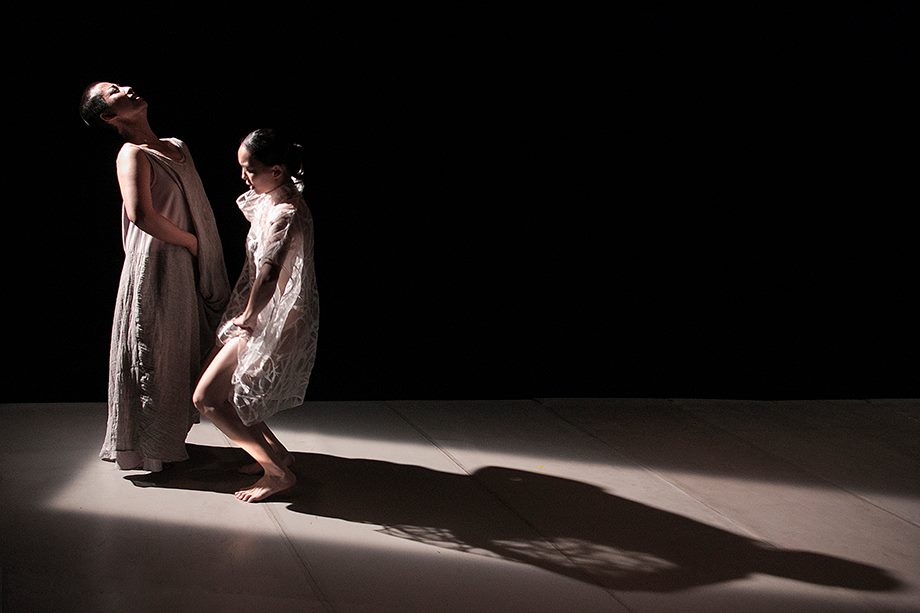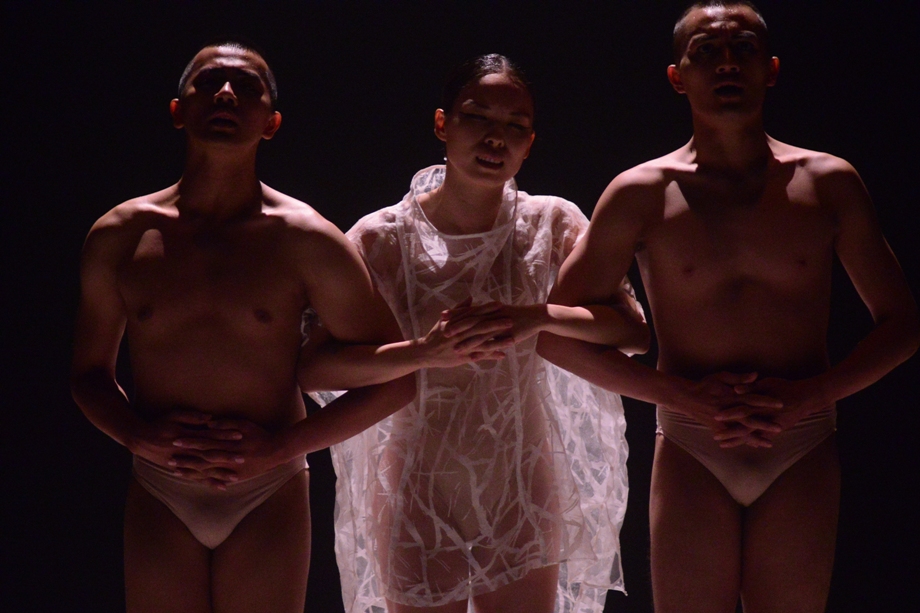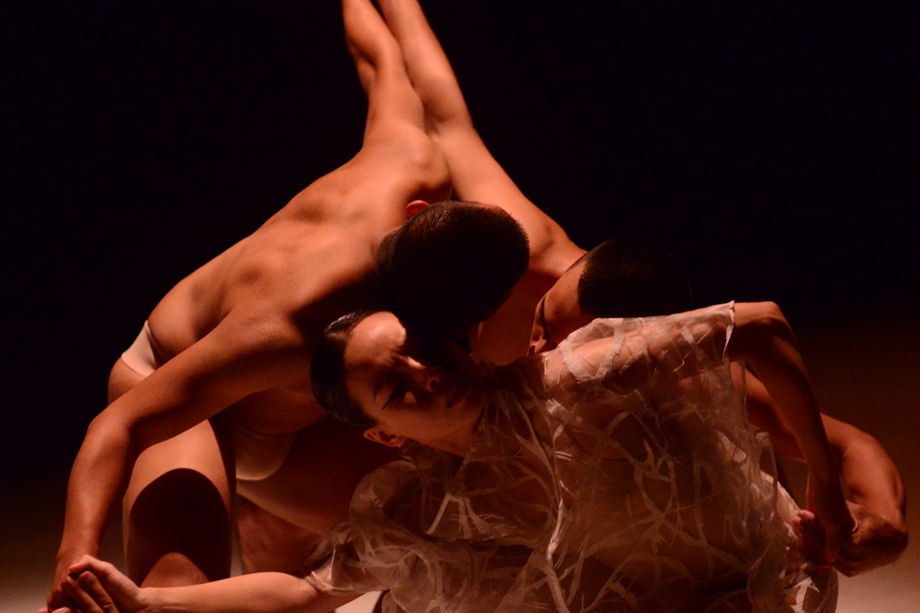《Qai~愛遺憶》為蒂摩爾古薪舞集2014年度製作,由藝術總監廖怡馨(Ljuzem Madiljin 路之.瑪迪霖)編創。
Qai~i 於排灣族語中意味著哀思情感與美感之表達,《Qai~i愛遺憶》有著對於情感的思念、嘆息、遺憾及不捨之意。作品文本概念源自於排灣族婚前儀式所面臨階層社會中對於男女交往婚嫁條件的約制,過去排灣族男女在婚前都採集體式的交遊。男子夜間結伴到女友們家拜訪,很少一對一交往的例子。雖然如此,每個人都會有最屬意的對象,但不公開表露。排灣族有許多無法和自己喜愛的人結婚,尤其是貴族頭目家的子女很難和平民家的子女成婚,因父母長輩永遠把家世身份的考量放在第一位。年長以後,回憶起青春時代自己真正喜愛但卻不能結合的戀人,心中都會充滿縈繞不去的情感,常常以 Qai~i 之語調表達內心深沉哀傷與源源不絕的思念情感。
《Qai~i愛遺憶》是場只有音樂與吟唱伴隨肢體動律的「純舞蹈」。演出作品捨棄雜沓的裝置,由兩男兩女完成一段六十分鐘的展演,在傳唱排灣族古調中,格外顯露穿透般的空靈,「無身」、「有聲」肢體,竄出一絲絲哀思,寂靜的劇場空間裡可與表演者貼近感受氣息!古謠吟唱中似乎纏著訊號,肢體便傳達美麗的哀與愁。編舞者堅持在限制中尋覓所謂的可能,表演者如時間刻畫的軌跡,帶著觀眾穿梭在回憶的空間裡。
蒂摩爾古薪舞集 Tjimur Dance Theatre
「蒂摩爾古薪舞集」為臺灣首支以排灣族文化為主體性的現代舞團,2006年由廖怡馨(路之.瑪迪霖Ljuzem Madiljin)擔任藝術總監,巴魯.瑪迪霖(Baru Madiljin)擔任舞蹈總監,期待創造出「原住民排灣族當代肢體美學」。嘗試從傳統排灣族樂舞一體形式轉化成現代舞的肢體語彙,以歌入舞、以舞寫歌,饒富舞者在舞台上的身體樣態。
Tjimur Dance Theatre is the first modern dance company that centers on the Paiwan culture in Taiwan. Founded in 2006, with LAIO Yi-hsin(or Ljuzem Madiljin) as its artistic director and Baru Madiljin as the dance director, Tjimur Dance Theatre hopes to create “the contemporary body aesthetics of the indigenous Paiwan tribe.” They draw inspiration from the form of ensemble in the traditional Paiwan song and dance, and transform it into the bodily language of modern dance, creating dances out of songs and composing music with dances, and by doing so, enriching the potentiality of the dancer’s body and performance on stage.
廖怡馨(Ljuzem.Madiljin 路之.瑪迪霖)
巴魯.瑪迪霖
林育誠
蒂摩爾古薪舞集
黃昭綸
陳柏維
拍達傳播事業有限公司
廖怡馨、許筑媛、楊淨皓、俞偉民
高雄正港小劇場
關鍵字
- 舞蹈
- 人聲歌唱
- 現代舞蹈
- 原住民
- 排灣族
- 婚嫁儀式
藝術家談作品
當你眼界未開時,不會知道自己的文化多麼重要。
路之.瑪迪霖:「當你眼界未開時,不會知道自己的文化多麼重要。」
評審談作品
扣人心弦的一支作品。
入圍理由 Reason for Nomination
將原住民樂舞的深沈底藴掏掘、淘洗、精煉,然後搓揉進一個充滿掙扎的關係主題,於是我們看到了蒂摩爾古薪、甚至是原住民劇場近年來最扣人心弦的一支作品。儘管舞作格局不大,聲音卻絕非微小。舞者身體聲音表現既質樸又具張力,化解了專業劇場表演者的過於世故、和原住民素人表演者身上隱藏不住的生澀之間的落差,我們終於可以放心期待傳統原住民樂舞在專業劇場的綻放,並為之喝彩。 提名觀察人 ─ 趙綺芳
The heritage of indigenous music and dance is excavated from the deep, purified, distilled, and then kneaded into a related theme that is full of struggle – thus we arrive at Qai~i—The Sigh of Memory, arguably the most exciting work of indigenous theatre in recent years. The magnitude of sound and fury in this dance work is disproportionate to its modest scale. The physical and aural expressions of the dancers are both pristine and intense, dissolving the discrepancy between the over-sophistication of professional theater performers and the self-consciousness of amateur indigenous performers. At last, we can rest assured that traditional indigenous music and dance will flourish on the professional stage, and give our applause. Nominator: CHAO Chi-Fang






